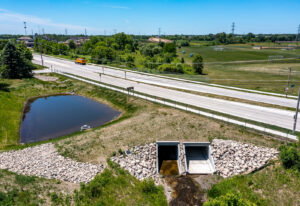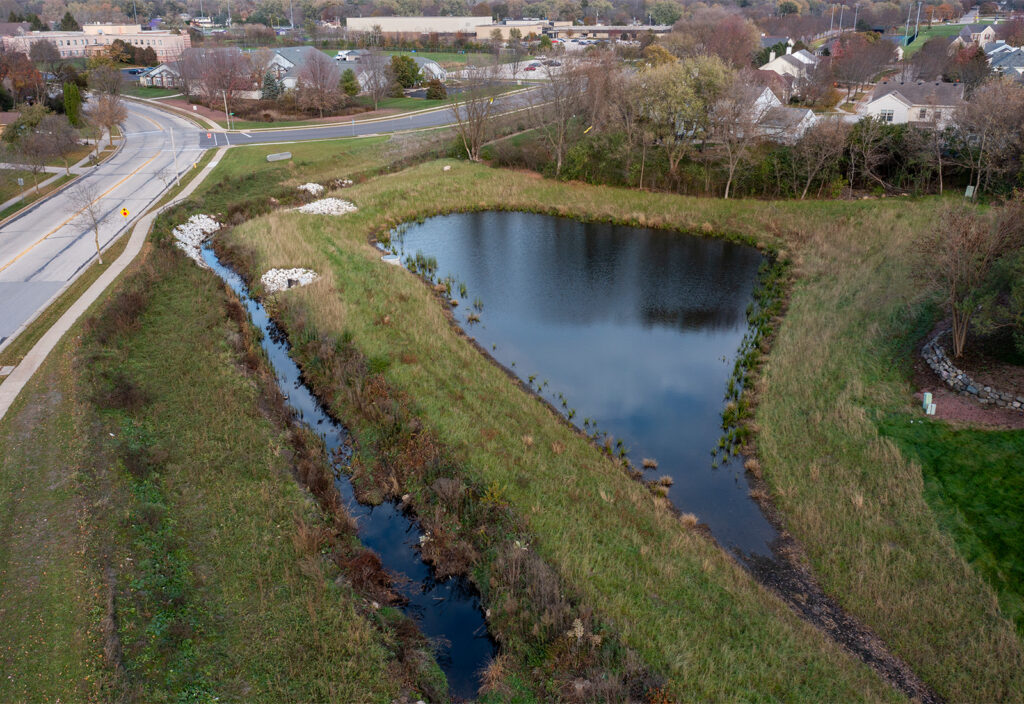Stormwater management is a critical aspect of urban planning and environmental conservation. It involves the control and use of stormwater to minimize its negative effects on communities and the environment. Private stormwater management devices play a vital role in this process, and regular inspections and audits of these systems are essential to ensure compliance with Municipal Separate Storm Sewer System (MS4) permit requirements.
An MS4 is a conveyance or system of conveyances that is owned by a state, city, town, village, or other public entity that discharges to waters of the United States and is designed or used for collecting or conveying stormwater. MS4 permits are part of the National Pollutant Discharge Elimination System (NPDES) program and require municipalities to control the discharge of pollutants to the maximum extent practicable to protect water quality.

raSmith designed a storm sewer system and wet detention basin for the Oakes Road project in Mount Pleasant, WI.
Private stormwater management devices such as detention ponds, permeable pavements, underground detention facilities, and bioretention facilities are often part of an MS4’s stormwater management program. These devices help to treat and manage stormwater at its source, reducing the burden on public stormwater systems and contributing to the overall health of the watershed.
Inspection Protocols
Performing inspections and audits of private stormwater management devices is a key component of maintaining MS4 permit compliance. These inspections help to ensure that the devices are functioning properly, being well maintained, and effectively controlling stormwater runoff, as designed.
The inspection process typically involves a thorough examination of the physical condition of the stormwater management device, including its structure, components, and vegetation. Inspectors look for signs of erosion, sediment accumulation, vegetation overgrowth, or damage that could impair the device’s function. They also review maintenance records and verify that the device is being maintained according to the manufacturer’s recommendations, maintenance plans, and permit requirements.
Compliance Audits
Audits are more comprehensive and may include reviewing the design and installation of the device to ensure it meets regulatory standards and is appropriate for the site conditions. Auditors may also assess the effectiveness of the device in managing stormwater quality and quantity, using data from monitoring equipment or sampling stormwater discharge. Regular audits can also identify potential issues before they become significant problems, allowing for timely maintenance and repairs.
Private stormwater management device inspections and audits are essential for maintaining compliance with MS4 permit requirements. These evaluations confirm the proper functioning of the devices, playing a crucial role in diminishing pollutants in stormwater runoff and safeguarding our vital water resources. It is imperative that municipalities and private property owners collaborate to ensure these inspections and audits are regularly performed. Promptly addressing any identified issues is also essential to preserving the stormwater management system’s integrity.

After evaluating stormwater management alternatives, raSmith retrofitted an existing wet detention basin to provide water quality benefits for the Waukesha Area 7 project in Waukesha, WI.
raSmith is Available to Assist
For successful inspections and audits in stormwater management, it’s crucial to assemble a team with expertise in the field’s practices and regulations. raSmith has the necessary tools and resources to execute comprehensive evaluations and compile in-depth reports of their observations. Discover how raSmith’s specialized stormwater management professionals can contribute to the success of your upcoming project.
